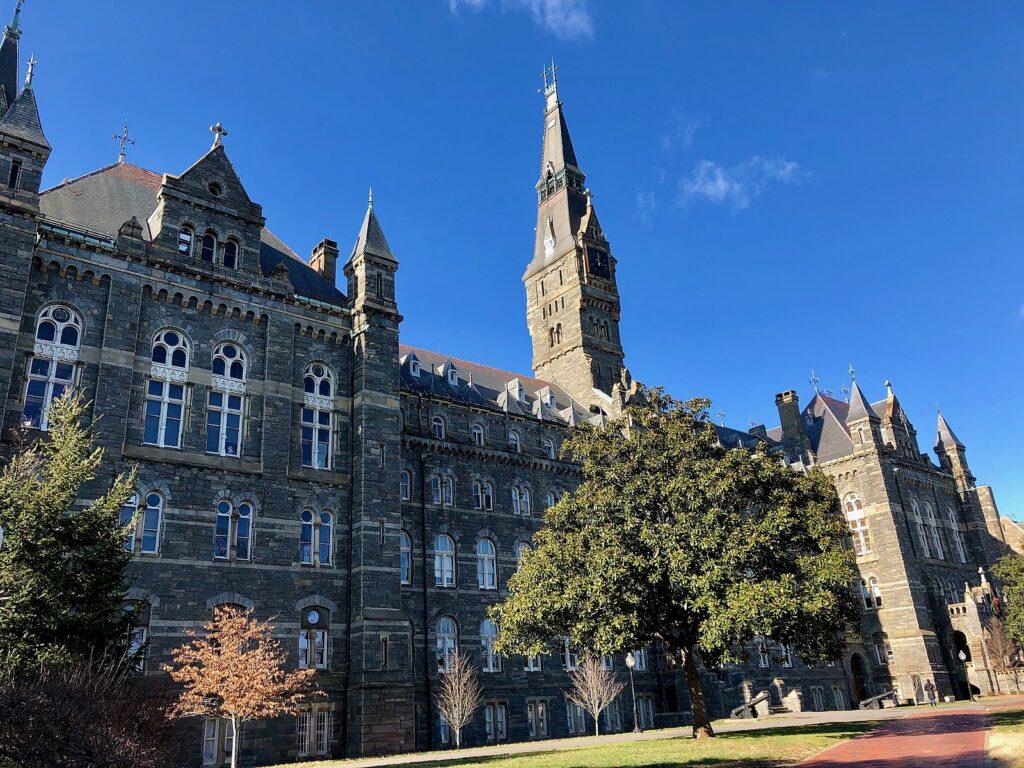Georgetown University’s Center on Faith and Justice hosted Harvard University political scientist Steven Levitsky for a conversation Nov. 14 about his new book, “Tyranny of the Minority,” and his thoughts on the degrading state of American democracy.
The Rev. Jim Wallis, the founding director of the Center on Faith and Justice, moderated the conversation for his podcast, “The Soul of the Nation,” which seeks to understand the role of faith in politics. Levitsky said his new book works to explain how democracies face crises and how that should be a warning sign for the future of America’s democracy.
“This book is an effort to describe the process by which democracies get into trouble sliding into crisis, so that Americans can see the warning signs before it is too late,” Levitsky said at the event.
Levitsky, the co-author of New York Times bestseller “How Democracies Die,” is a comparative political scientist focusing primarily on Latin America. However, “Tyranny of the Minority” discusses the U.S. political system and the current failings in the United States’ democracy.
Levitsky cited several causes for recent anti-democratic policies and events, including the Republican Party’s appeals to white evangelical voters and defects in the U.S. Constitution like the two-thirds vote of both houses of Congress or the two-thirds vote of States required to amend it.
Levitsky said the Republican Party’s 20th-century electoral strategy of appealing to disaffected white voters has led to an increase in voting rights issues in the last 50 years.
“For 25 years in the latter part of the 20th century, the Republicans systematically appealed to white resentment, and they succeeded,” Levitsky said. “The strategy eventually ran into trouble, because just as the Republicans were establishing themselves as America’s white Christian party, the United States was becoming a lot less white and a lot less Christian.”
“When Republicans realized this, they started to panic. And that’s where we started to see the first efforts to restrict people’s access to vote in 2010, 2012 and 2013,” Levitsky added.
For example, Republican majority states such as Alabama have enacted new restrictions on voting, such as requiring voters to have a voter ID to cast a ballot. Similarly, states such as Ohio and Georgia have enacted laws which eliminate voters from registration rolls if they have not participated in a recent election.
Levitsky said it is vital that the United States be multicultural and pluralistic, in contrast to this Republican vision of a white, Catholic America.
“We stand at a crossroads: either America will be a multiracial democracy, or it will not be a democracy at all,” Levitsky said.
Levitsky said the Jan. 6 insurrection and allegations of voter fraud during the 2020 election reflect the Republican Party’s attitude on democracy, which Levitsky sees as a threat to American democracy.
“This is the behavior of a party that is no longer committed to democracy,” Levitsky said.

While Levitsky believes that policies related to judicial appointments, immigration and border security and the coronavirus pandemic under former President Donald Trump demonstrate anti-democratic tendencies, he said democracy is at risk when several parties share anti-democratic ideals, not just one leader.
“No single leader is capable of killing a democracy,” Levitsky said. “It’s when mainstream political parties and a few politicians tolerate, accommodate and cooperate with anti-democratic extremists. That is when democracy gets into trouble.”
Levitsky said the U.S. Constitution has created undemocratic political institutions, including the Senate and the Electoral College system. So far, America has had five presidents that have lost the popular vote while still winning the electoral vote and claiming the presidency.
“Senators do not represent people, they represent land,” Levitsky said. “Politicians are supposed to represent people.”
“We are the only presidential democracy on Earth where the loser of the popular vote can win the presidency,” Levitsky added.
Despite the factors contributing to a decline in American democracy, Levitsky said he remains hopeful about the future of democracy globally. Currently, 167 countries worldwide have some form of democracy.
Levitsky discussed the various examples of democracy being defended around the world, such as in Poland, Malaysia, Thailand, Sri Lanka, Venezuela, Mexico and Brazil, which suggests that it is not easy to extinguish democracy.
“We’ve got to keep fighting no matter who wins the 2024 election,” Levitsky said. “We’re going to have to get up the next day and still work to defend our democracy.”
Levitsky said he urges activists and young people to strive to make the United States more democratic and to be patient throughout their actions.
“You have to pace yourself and not lose faith,” Levitsky said. “One of the lessons that we learned from all the most successful reform movements in this country, whether it’s women’s suffrage or civil rights, is that those struggles take a long time. Good struggles take time.”














